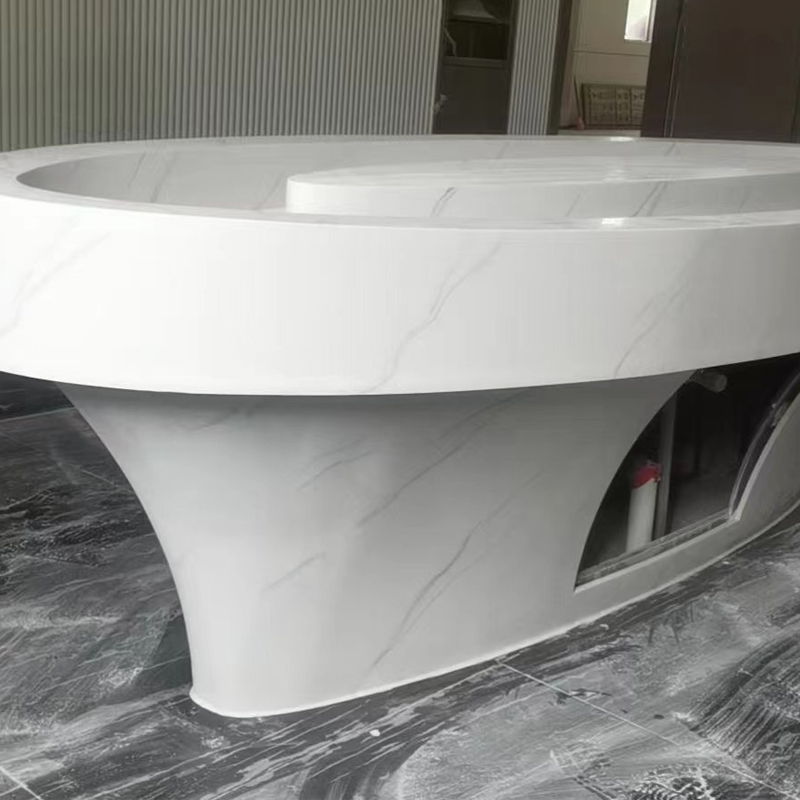
A composite marble sink is an engineered surface material composed of approximately 93% natural marble powder and 7% high-performance resin binders. This combination creates a non-porous, homogeneous material with superior physical properties compared to natural stone. The manufacturing process involves vacuum vibration compression at 1,200-1,500 psi followed by curing at controlled temperatures between 60-80°C (140-176°F) for optimal polymerization.
Unlike natural marble which has visible veins and inconsistent patterns, composite marble offers uniform coloration with ≤0.3% water absorption rate (ASTM C97 standard) and Mohs hardness of 4-5, making it more resistant to etching and scratching than pure calcium carbonate-based natural marble (Mohs 3).

The resin matrix provides exceptional flexural strength measuring ≥18 MPa (ASTM C880), significantly higher than natural marble's typical 10-12 MPa. Impact resistance tests show composite marble can withstand 1.5-2 Joules of force without cracking, compared to natural marble's 0.8-1.2 Joules threshold.
With a thermal conductivity of 1.5-2.0 W/m·K, composite marble maintains stable surface temperatures within ±2°C of ambient conditions, unlike natural stone which can vary by ±5°C. The material demonstrates dimensional stability across temperatures ranging from -30°C to 120°C (-22°F to 248°F) with ≤0.05% linear expansion.
Laboratory testing per ASTM D543 shows excellent resistance to:
Household acids (pH 2-5): ≤0.1 mg/cm² weight loss after 24h exposure
Alkaline cleaners (pH 8-11): no visible degradation after 500 cycles
Common solvents (ethanol, acetone): ≥4H pencil hardness retained
The non-porous surface achieves ≤1 CFU/cm² bacterial retention (EN 13697 standard), outperforming porous natural marble which typically shows 10-50 CFU/cm². Antimicrobial additives in premium grades reduce E.coli and S.aureus populations by 99.9% within 24 hours (ISO 22196).
Master bathrooms: Ideal for vessel sinks with 12-18mm thickness, supporting ≥50kg point loads
Kitchen prep sinks: Resists knife marks (up to HRC 55 steel) and thermal shock from boiling water
Powder rooms: Available in 300+ RAL colors for design flexibility
Hotel lobbies: Withstands 500+ daily cleanings without surface degradation
Hospital scrub sinks: Meets ISO 22196 antimicrobial standards
Laboratory workstations: Chemical-resistant properties suitable for pH 1-13 environments
Use pH-neutral cleaners (pH 6-8) with ≤5% surfactant concentration. Microfiber cloths with <100> fiber diameter prevent micro-scratches. For disinfecting, ethanol-based solutions (70% concentration) achieve optimal efficacy without damaging the resin matrix.
For organic stains (coffee, wine): Prepare a poultice with 30% hydrogen peroxide and diatomaceous earth (5-20µm particle size). Apply for 12-24 hours under plastic wrap. Mineral deposits respond to 10% acetic acid solutions with 5 minute contact time.
Every 3-5 years, perform mechanical polishing with:
50-100µm diamond abrasive pads for deep scratches
Progressive refinement to 3-5µm finishing pads
Final buffing at 1,500-3,000 RPM with oxalate-based compounds
Inspect mounting hardware annually for:
Clips: Torque to 2.5-3.5 N·m
Adhesive bonds: Check for ≥90% contact area
Undermount supports: Verify ≤0.5mm deflection under load
FAQ
What is a composite marble sink made of?
A composite marble sink is made from a blend of natural minerals and advanced resins, creating a durable and aesthetically pleasing material that resembles natural stone.
What are the advantages of using a composite marble sink?
The advantages include high durability, scratch and stain resistance, antibacterial properties, a variety of colors and designs, easy maintenance, and resistance to heat and chemicals.
How do I clean and maintain a composite marble sink?
Clean the sink with mild soap and water using a soft cloth or sponge. Avoid abrasive cleaners and scrubbers, as they can scratch the surface. Regularly wipe down the sink to prevent buildup.
Can a composite marble sink be installed as an undermount?
Yes, composite marble sinks can be installed as undermount sinks, providing a seamless look and making it easier to clean the countertop.
Are composite marble sinks environmentally friendly?
Yes, many composite marble sinks are made from eco-friendly materials, free from volatile organic compounds (VOCs) and harmful chemicals, making them a safe choice for indoor environments.
How do I choose the right size composite marble sink for my space?
Consider the available counter space, the layout of your bathroom or kitchen, and your personal preferences. Measure the area where the sink will be installed and choose a size that fits well without overcrowding the space.
What colors and styles are available for composite marble sinks?
Composite marble sinks come in a wide range of colors, including classic white, warm beige, modern gray, elegant black, and various patterned designs that mimic natural stone.
How durable are composite marble sinks compared to natural stone sinks?
Composite marble sinks are generally more resistant to scratches, stains, and chipping than natural stone sinks. They also tend to be lighter and easier to install.
Can composite marble sinks be customized?
Yes, many manufacturers offer custom sizes, colors, and designs to meet specific customer needs and preferences, allowing for a personalized touch in any space.
What is the warranty period for composite marble sinks?
Answer: The warranty period typically ranges from five to ten years, depending on the manufacturer, covering defects in material and workmanship to ensure customer satisfaction.